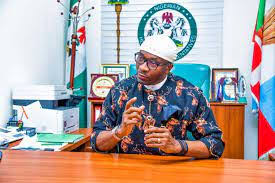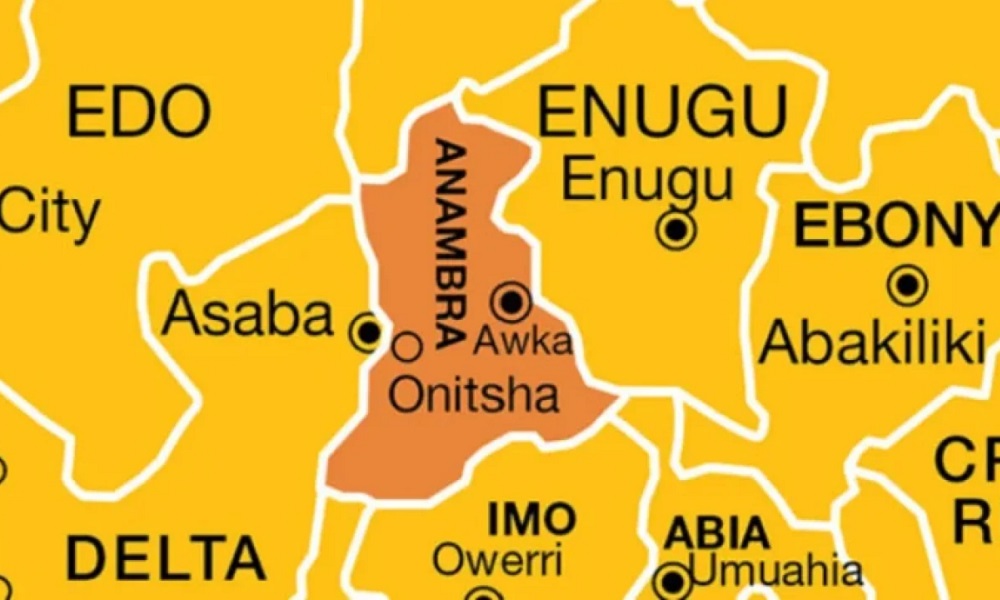News
First draft constitution ready in August, final copy for presidential assent after NASS’ voting out in August, 2025-Kalu

…as Committee calls for memoranda from Nigerians
Deputy Speaker of the House of Representatives, Hon. Benjamin Okezie Kalu has said that the first draft report of the ongoing review of the 1999 constitution would be ready in August 2025 just as the final clean copy for the presidential assent after the voting on the expected issues of concern by the two chambers of the national assembly would be out in August, 2025.
Kalu dropped the hints at a press conference by the House Committee on Constitution Review on Thursday.
It will be recalled that the committee on its inauguration, Monday, in Abuja gave a 24 month timeline for the conclusion of the exercise.
At the press conference, Kalu who doubles as the chairman of the committee said: “We are pushing to ensure that in our activities, that in no distance time, the first draft of the work we are trying to do in the constitution will be ready.
“This will be subject to approval of the work done by the subcommittee. Let me mention that our target, the first draft of the constitution will be out in August 2024.
“Second draft will be out in October 2024, we will commence zonal inputs from October 2024, we’ll keep collecting inputs from citizens from 14th October 2024 as we prepare for the last version or that last draft copy of the constitution.
“We are hoping that there will be a harmonization of the issues, on the 27th, 28th February 2025.
“We are hoping that during a technical working retreat that will take place in February 2025, the Senate and the House of Representatives documents will be harmonized.
“It is our desire that on the 17th of March 2025, we will have harmonized documents considered in the House. It is our believe that by April 2025, we will have the final copies of draft amendments produced.
“We are optimistic also that by 12th May 2025, we’ll have, the final clean copy of amendments bills agreed on.
“And we are looking at 22nd May 2025, as a time when we will have final report laid for consideration and voting.
“This is to say that members will be voting on the work we have done on this important date of 22nd May 2025
“We are believing that around the 29th of May or 13th of June knowing fully well what these important dates mean to Nigerians, we will expect the final concurrence of state assemblies secured.
“If it delays more than that, it will not go beyond August of 2025 because we believe that by August 2025, the president will receive the bills that will be presented to him for presidential assent. So, our targets that transmission of bills to Mr President for assent will take place August 2025.
“And with this, we are sure that our target to get this job done in 24 months will be achieved if we send it Mr President by August 2025 and hoping that by December we will have a constitution that’s fully amended. Thank you very our guests and honorable colleagues”.
The Deputy Speaker also called for submission of memoranda from different interest groups, Civil Society Organizations (CSOs), Labour Unions, relevant institutions of government and the members of the general public to aid the committee’s work.
He said that the thematic areas included Federal Structure and Power Devolution; Local Government/Local Government Autonomy; Public Revenue, Fiscal Federation, and Revenue Allocation; Nigerian Police and Nigerian Security Architecture; Comprehensive Judicial Reforms; Electoral Reforms to strengthen INEC to deliver transparent, credible, free and fair elections; Socio-economic and cultural rights as contained in Chapter 2 of the
constitution and Traditional Institutions.
Other were Issues of Gender; Strengthening the Independence of oversight institutions and agencies created by the constitution or pursuant to an Act of the National Assembly; Residency and Indigene Provisions; Immunity; The National Assembly; Process of state creation and State access to mining.
“In exercise of the powers conferred on the Legislature by Sections 4, 8, and 9 of the Constitution of the Federal Republic of Nigeria 1999 (as
Amended) and Order 20, Rule 30 of the Standing Orders of the House of
Representatives (11th Edition) and the Legislative Agenda of the 10th
House of Representatives, I am pleased to invite the Executive and
Judicial bodies, State Governments, Women Groups, Academics, Civil
Society Organizations, Labour Unions, Professional bodies, Ethnic
Nationalities, Nigerians in the Diaspora, Diplomats and the general public,
to submit memoranda or proposals for further alteration(s) of the 1999
Constitution (as amended) on the following thematic areas: The Federal Structure and Power Devolution; Local Government/Local Government Autonomy; Public Revenue, Fiscal Federation, and Revenue Allocation; Nigerian Police and Nigerian Security Architecture; Comprehensive Judicial Reforms; Electoral Reforms to strengthen INEC to deliver transparent, credible, free and fair elections; Socio-economic and cultural rights as contained in Chapter 2 of the
constitution; Traditional Institutions; Issues of Gender; Strengthening the Independence of oversight institutions and agencies created by the constitution or pursuant to an Act of the National Assembly; Residency and Indigene Provisions; Immunity; The National Assembly; Process of state creation; State access to mining”, he said.
The committee however extended the call for memoranda to “any other matter that will promote good governance and the welfare of all persons in our country on the principles of freedom, equality, and justice”.
News
EU leaders meet in Ukraine demand Russia’s unconditional 30-day ceasefire

In a significant diplomatic push on the ongoing Russia-Ukraine war, European leaders convened in Ukraine’s capital, Kyiv on Saturday, where they called out Russian President, Vladimir Putin, to agree to a 30-day unconditional ceasefire.
The European leaders threatened “massive sanctions” if Moscow fails to comply with their demand, according to Al Jazeera.
French President, Emmanuel Macron, German Chancellor, Friedrich Merz, and British Prime Minister, Keir Starmer, travelled together by train from Poland to Kyiv, later joined by the Polish Prime Minister, Donald Tusk.
The visit marked the first joint mission by leaders of these four European nations to Ukraine.
In a joint press conference with Ukrainian President, Volodymyr Zelenskyy, the leaders underscored their unified demand for an immediate halt to hostilities.
The proposed ceasefire, covering land, sea, and air operations, is seen as a critical step toward ending the three-year conflict.
Macron warned that the European bloc is prepared to escalate sanctions, specifically targeting Russia’s energy and banking sectors, should Putin refuse the proposal.
He also floated the idea of deploying foreign troops as a reassurance measure, saying, “The United States would take the lead in monitoring a proposed ceasefire, with support from European countries.”
Starmer delivered a sharp rebuke, stating, “Only one country started this illegal conflict, and that was Russia and Putin, and only one country stands in the way of resolving it peacefully, and that is Russia and Putin.”
Zelenskyy’s chief of staff, Andriy Yermak, highlighted the visit’s significance, saying, “There is a lot of work to do, a lot of topics to discuss.
“We must end this war with a just peace. We must force Moscow to agree to a ceasefire,” Al Jazeera reports.
Meanwhile, the Kremlin dismissed the European leaders’ demands, describing it as confrontational.
Russian spokesman Dmitry Peskov reportedly said, “We hear many contradictory statements from Europe.
“They are generally confrontational in nature rather than aimed at trying to revive our relations. Nothing more.”
The call for a ceasefire is also backed by U.S. President Donald Trump, who has proposed the 30-day halt as a foundation for peace negotiations.
However, Putin has so far resisted international pressure.
Ukraine’s Foreign Minister Andrii Sybiha reiterated Kyiv’s readiness, saying, “Our country and its allies are ready for a full, unconditional ceasefire with Russia for at least 30 days starting on Monday.”
The visit came a day after Putin struck a defiant tone during a military parade in Moscow commemorating the 80th anniversary of World War II victory, underscoring the entrenched tensions.
Al Jazeera’s Zein Basravi, reporting from Kyiv, noted that while the visit was “symbolic,” it also involved practical efforts to ensure U.S. engagement in future peace talks.
After the meetings, Ukraine’s Ministry of Foreign Affairs confirmed that the five leaders held a phone call with Trump to coordinate their peace strategy.
Sybiha emphasized on X, “If Russia agrees and effective monitoring is ensured, a durable ceasefire and confidence-building measures can pave the way to peace negotiations.”
The leaders issued a joint statement stressing their commitment, saying, “Alongside the US, we call on Russia to agree [to] a full and unconditional 30-day ceasefire to create the space for talks on a just and lasting peace.
“We are ready to support peace talks as soon as possible, to discuss technical implementation of the ceasefire, and prepare for a full peace deal.”
They noted, “The bloodshed must end, Russia must stop its illegal invasion, and Ukraine must be able to prosper as a safe, secure and sovereign nation within its internationally recognised borders for generations to come.”
News
NDLEA nabs Iran-bound woman with cocaine in private part, stomach, bag at PH airport(Photos)

. ..arrests 22-year-old British ex-convict with large drug shipment at MMIA; intercepts fuel tanker, 3 vehicles with 3, 047kg skunk in Niger, 775 litres of codeine in Kano
Desperate attempt by a woman, Ihensekhien Miracle Obehi who disguised with hijab to export large consignments of cocaine concealed in her private part, stomach and false bottom of her handbag to Iran has been thwarted by operatives of the National Drug Law Enforcement Agency (NDLEA) at the Port Harcourt International Airport, Port Harcourt, Rivers state.
Obehi who was dressed in hijab to beat security checks was intercepted at the departure hall of the Port Harcourt airport on Sunday 3rd May 2025 while trying to board a Qatar Airline flight to Iran via Doha following credible intelligence. During her search, she was found to have inserted three wraps of cocaine in her private part, and two large parcels hidden in false compartments of her handbag while she swallowed 67 pellets of the Class A drug.
As a result, she was placed under excretion observation and after four excretions that lasted days, she expelled the 67 wraps of the substance in her stomach. She claimed she was to swallow 70 pellets of cocaine but after ingesting 67 pieces she could no longer swallow the remaining three and decided to insert them into her private part. The total weight of the three consignments hidden in different parts of her body comes to 2.523 kilograms.
In like manner, NDLEA operatives at the Murtala Mohammed International Airport, MMIA, Ikeja Lagos on Friday 9th May intercepted a 22-year-old British national, Campell Kaizra Kofi Johannes Slifer coming from Thailand through Doha on Qatar Airways flight with two suitcases loaded with 35 parcels of Loud, a strong strain of cannabis weighing 37.60kg.
Campell who claimed he had twice been convicted in the UK for drug trafficking and robbery, said he was recruited in London to travel to Thailand to pick the illicit consignment and bring same to Nigeria.
In Niger state, NDLEA officers acting on intelligence on Wednesday 7th May intercepted a fuel truck marked ABJ 693 XU and three other vehicles loaded with 246 bags of skunk, a strain of cannabis with a combined weight of 3, 047 kilograms along Suleja-Kaduna road. Four suspects arrested with the exhibits include: Christopher Onyema, 47; Benedict Etineruba Young, 54; Chukwudi Ujue Jerry, 30; and Mohammed Abdullahi Danasabe. Apart from the fuel truck, three other vehicles recovered from the suspects include: Honda Odyssey bus marked YAB 667 CZ; Gulf bus with registration number GWA 125 TQ and
Honda Odyssey bus marked ABJ 230 CN.
At Oja Amukoko in Ijora area of Lagos, two suspects: Eze Chekube Emmanuel and Ike Samuel Chinyerem were on Thursday 8th May arrested by NDLEA operatives with a total of 109,914 pills of tramadol, swinol and nitrozepam seized from them.
While 52.5kg skunk was recovered from two suspects: Lukman Sabo Umar, 23, and Tukur Ammadu, 20, in a bus at Gwantu, Sanga LGA, Kaduna State on Tuesday 6th May, NDLEA operatives on patrol along Bode Saadu- Jebba expressway, Kwara State on Monday 5th May
arrested Rufai Nasiru with 45,400 pills of tramadol 225mg.
In Bauchi state, NDLEA officers on patrol along Bauchi-Gombe road on Tuesday 6th May intercepted a Toyota Tundra jeep marked RBC 111 DW conveying 526 blocks of skunk weighing 505kg with two suspects: Isaac Onogure, 37 and Ikechukwu Peter, 44, arrested.
A total of 31 kegs containing 775 litres of codeine syrup were recovered from two suspects:
Hafizu Isa Uman, 34, and Ismail Shehu, 48, when NDLEA operatives raided their hideout at Rijiyar Zaki area of Kano on Saturday 10th May, while 1.1kg of Loud consignment concealed in pillow coming from Thailand was on Tuesday 6th May intercepted by NDLEA officers at a courier company in Lagos.
The War Against Drug Abuse, WADA, social advocacy activities by NDLEA Commands equally continued across the country in the past week. Some of them include: WADA sensitization lecture delivered to students and staff of Federal Government College, Sokoto; Deeper Life International College, Nteje, Anambra; Martins Sanda Girls Science College, Paikoro, Niger state; Restoration Power International School, Idua Eket, Akwa Ibom; while Oyo state command delivered WADA enlightenment lecture to members of the League of Imams and Alfas at Iseyin Central Mosque, Iseyin, among others.
While commending the officers and men of DOGI, MMIA, PHIA, Lagos, Kano, Kaduna, Bauchi, Kwara, and Niger Commands of the Agency for the arrests and seizures of the past week, Chairman/Chief Executive Officer of NDLEA, Brig. Gen. Mohamed Buba Marwa (Rtd) equally praised their counterparts in all the commands across the country for pursuing a fair balance between their drug supply reduction and drug demand reduction efforts.
News
Anambra takes action against primary school over N5,000 prefect nomination fee

The Anambra State Government has slammed a one-month sanction on Blossom Fount School, Awka, for monetising student leadership by charging pupils N5,000 to contest for the position of head prefect.
The sanction, announced on Saturday by the state Commissioner for Education, Prof. Ngozi Chuma-Udeh follows reports that the school imposed the controversial fee on pupils in its primary section vying for leadership roles.
Describing the practice as “despicable,” Chuma-Udeh expressed outrage at what she called an attempt to commercialise student leadership and exploit the ambitions of young children.
She said, “Investigation is going on to know how the school is being run. It is an act of selling the psyche of the children to the highest bidder from the cradle, and it is not acceptable to this government.”
“The act of commercialising student leadership and exploiting children’s ambitions for financial gain is despicable. It amounts to selling the psyche of the children to the highest bidder from the cradle, and it is strongly condemned,” she added.
Chuma-Udeh stressed that Governor Chukwuma Soludo’s administration remains committed to upholding integrity and fairness within the education system, stating that such practices will not be tolerated.
According to reliable sources, the ministry’s investigation is still ongoing, and further sanctions may be imposed depending on the outcome. The goal, officials say, is to ensure accountability and deter similar actions in schools across the state.
-

 News19 hours ago
News19 hours agoTrouble brewing as Trump’s supporters move against Pope Leo, give reason
-

 News21 hours ago
News21 hours agoNaira Rebounces Against Dollar – Saturday, May 10, 2025
-

 News21 hours ago
News21 hours agoHow doctor stole one of my twins during birth, Abuja housewife narrates nasty experience
-

 News19 hours ago
News19 hours agoChina Responds to AFN Claims Over Visa Delays for World Relays in Guangzhou
-

 Entertainment8 hours ago
Entertainment8 hours agoFemi Adebayo wins 2025 AMVCA ‘Best Lead Actor Award
-

 News9 hours ago
News9 hours agoNatasha’s TikTok vibe to Tinubu’s song raises concerns about potential defections
-

 News19 hours ago
News19 hours agoDigital Shift in National Assembly No Longer Optional – CNA Ogunlana
-

 News19 hours ago
News19 hours agoReflections of Hon. EJ Agbonayima on Nation Building









